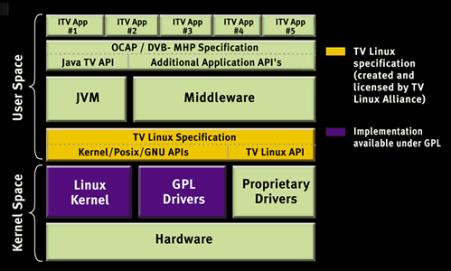Two dozen companies to bring Linux to TV set-tops
Jun 12, 2001 — by Rick Lehrbaum — from the LinuxDevices Archive — 2 views[updated 8:15am PDT June 12, 2001] — Chicago; NCTA Show — (press release excerpt) — two dozen companies today announced formation of the TV Linux Alliance, which will define a standards-based Linux environment for the digital set-top box market. The technology suppliers to cable, satelite, and telecommunications operators have allied to produce Linux standards designed to improve time-to-market and… product robustness in the advanced set-top box market.
The founding companies are: ACTV, ATI Technologies, Broadcom Corporation, Concurrent Computer Corporation, Conexant, Convergence Integrated Media, DIVA, [email protected], iSurfTV, Liberate Technologies, Lineo, MontaVista, Motorola, nCUBE, OpenTV, Pace Micro Technology, Qpass, ReplayTV, STMicroelectronics, Sun Microsystems, TiVo, Trintech, TV Gateway, and WorldGate.
The alliance will define a standard application programming interface (API) that will simplify the implementation of TV middleware and device drivers for the Linux operating enrvironment, allowing network operators to select from a variety of vendors whose offerings are interoperable with the common API. The alliance plans to capitalize on Linux designs already underway among various founders and harmonize early work across the industry to ensure that Linux is delivered to the digital set-top under a common framework of evolving standards-based specifications. Linux is a proven, stable, and robust open source operating system with a strong developer community, making it an intelligent choice for network operators, infrastructure providers, and hardware manufacturers.

This single, standard API will help suppliers to bring technologies to market more quickly, while competing on software implentations supporting a common API. As a result, the alliance expects this new standard to:
- Provide a wider variety of set-top box software technologies delivering a stable operating environment with decreased development costs.
- Leverage open solutions and build upon the work of software developers worldwide.
- Shorten time-to-market for chipset and middleware vendors and ease integration of advanced set-top applications.
- Support implementation of industry television standards such as CableLabs' OpenCable Application Platform (OCAP), Digital Video Broadcast's Multimedia Home Platform (DV8-MHP), and other middleware specifications.
Chipset manufacturers will benefit by the availability of a clear roadmap for supplying Linux-based device driver support, and can expect shorter time-to-market for their API-enabled hardware solutions. Middleware vendors will benefit from more efficient and easier porting of middleware solutions and integration of interactive applications.
The new Linux specification developed by alliance members is expected to be available later this year. Parties that are interested in tracking the progress of the TV Linux Alliance or in accessing the resulting specifications should visit the alliance website, www.TVLinuxAlliance.org.
This article was originally published on LinuxDevices.com and has been donated to the open source community by QuinStreet Inc. Please visit LinuxToday.com for up-to-date news and articles about Linux and open source.